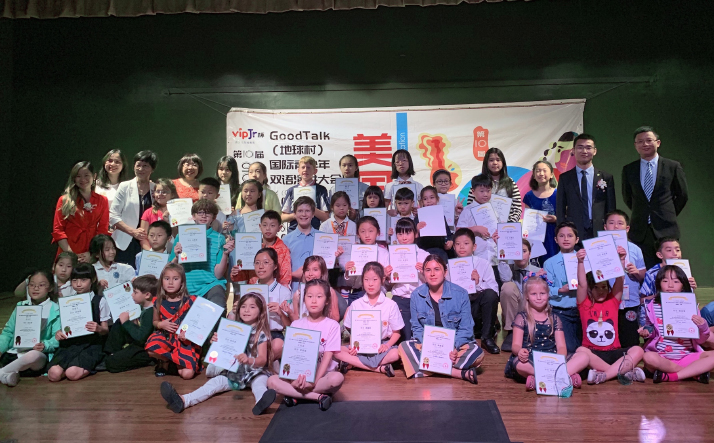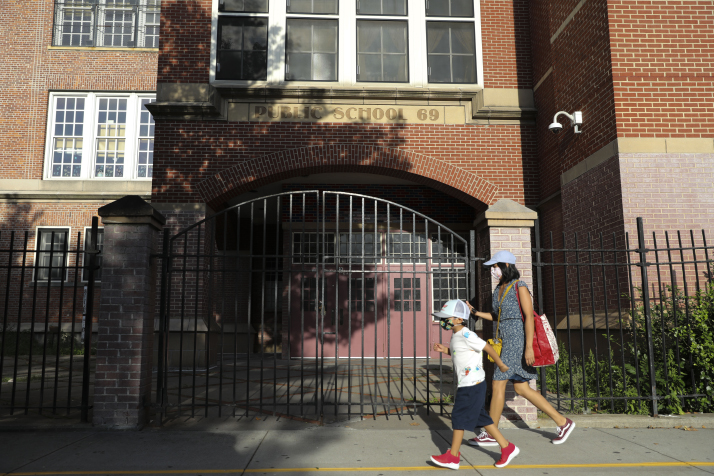| World |
| Educationists stay optimistic about China-U.S. academic exchanges in the long run | |
|
|
 Children from China and the U.S. and organizers pose for a group photo at the end of a bilingual speech convention at the California State University, Long Beach, the U.S., on July 13, 2019 (CNSPHOTO)
Pan Qingzhong, Executive Dean of Schwarzman College of Tsinghua University, has witnessed many of his U.S. students' transformation—from knowing little about China to introducing China to others. "Once, a student said before he came to China, he had thought China was much smaller than Viet Nam," Pan said at a China-U.S. educational exchange webinar on September 12. The dean was incredulous. He found it hard to believe that even in this information and Internet era, a U.S. university graduate didn't have any clue about the size of one of the biggest countries in the world. China's territory is over 30 times that of Viet Nam's. Then he realized that it could be because many Americans are more familiar with Viet Nam due to the Viet Nam War, which lasted for decades, inspiring many Hollywood films. On the other hand, many young Americans, like his students, know hardly anything about China. Discovering real China That made Pan determined to see that the students get more opportunities to learn about China, the real China, rather than the one depicted by the U.S. media and politicians. "We took them to Shenzhen in the southern province of Guangdong to show them what the most developed Chinese metropolises are like. They also visited villages in the northwest and observed first-hand people's lives in such underdeveloped regions," Pan said. After such journeys of discovery, Pan's students say they now understand China and Chinese policies better. "Knowing each other is a good start to building a sound relationship, and that's what we pursue," Pan said. Every year, Schwarzman College enrolls about 200 students from China, the U.S. and other countries. It is an example of China-U.S. educational exchanges, and promotes U.S. students' understanding of China. Educational exchanges between the two countries have been an important part of the China-U.S. relationship since their diplomatic relations were established in 1979. However, they have faltered due to recent restrictions by Donald Trump's administration, and especially now, due to escalating smear campaigns against China ahead of the looming presidential election. But many Chinese and U.S. scholars still remain optimistic about future educational cooperation. United against pandemic At the webinar, Susan Sclafani, former Assistant Secretary for Vocational and Adult Education in the U.S. Department of Education, talked about the effects of the novel coronavirus pandemic on universities in the U.S. They were shut down in spring and summer, and she said it might be difficult to reopen them even in autumn. "Unlike in China, where you were able to offer online education for all students working with your administration, we left it to the states, and many states left it to each school district to try and provide the technology and curriculum resources," she said. "Some students did not respond actively during online learning, some did not participate at all. " As early as April, she said a colleague at Beijing Normal University shared with her plans for ensuring quality education during the pandemic. Sclafani then shared them with other educators and policymakers in the U.S. in the hope they would emulate some of the good practices. With the pandemic contained in China, Chinese universities reopened in September and students returned to classrooms. For international students unable to return to U.S. universities, the authorities said some could continue their studies on Chinese campuses. For example, students of Georgia Institute of Technology could continue their fall classes through remote learning or at the Shenzhen campus. New York University students can attend classes on the Shanghai campus. How to develop a stronger relationship between Chinese and U.S. universities is another matter of concern for educators in both countries. John Delaney, Dean of the Kogod School of Business, American University, thinks one good way is for American universities to open more campuses in China or joint campuses with Chinese higher-learning institutions.  People walk past a public school in New York City, the U.S., on September 1. The city's plan to reopen schools on September 10 was postponed due to a resurgence of coronavirus infections (XINHUA)
Results of exchange "In spite of the current unfavorable political environment, the presidents of many prestigious American universities such as Harvard, Yale and Stanford have all reiterated their welcome and support to international students and scholars, including Chinese students," Li Li, deputy head of the Sino-American Friendship Association, said. The Trump administration has imposed some restrictions on Chinese students and scholars, especially in technology areas, out of what it called security concerns. However, the participants at the webinar rejected the excuse. "Without Chinese students, we will lose a level of the international dialogue that has been such a healthy part of innovation in both the U.S. and China," Sclafani said. "If we did not have this continued collaboration of ideas, it will be difficult to do the level of science, the level of engineering that is currently being done because we have such excellent students from both the U.S. and China working collectively to come up with new ideas, new theories that they could further explore." According to a New York Times report, nearly one third of the top artificial intelligence researchers in the U.S. are from China. Most of them finished their undergraduate degree in China, went to the U.S. to continue their studies, and then worked for U.S. research institutions. When they go back to China, they take ideas with them and the knowledge of doing things differently, which has a positive impact on Chinese society, Sclafani said. Many Chinese students who had studied in the U.S. returned and became successful in their fields. Ding Zeming, a renowned Chinese scholar on U.S. history, is one of them. In 1947, Ding enrolled in Washington University to study U.S. history. After graduation, he returned to China, became a professor, and contributed tremendously to promoting Chinese people's understanding of the U.S. Through his writing and teaching, he passed on what he had learned in the U.S. to younger generations. One of his students, Yuan Peng, followed in his mentor's steps and went to study in the U.S. He became a reputed researcher on U.S. studies and dean of the China Institutes of Contemporary International Relations. Such people brought back first-hand knowledge of the lifestyle and culture in the U.S., which accelerated Chinese understanding of the U.S., according to observers. "Educational communication and cooperation between China and the U.S is a strong connection between the two countries," Li said. "Young people are the future of China-U.S. relations. We firmly believe that the current obstacles are temporary. This is just a small episode in the political and social development of the U.S." (Print Edition Title: An Enduring Bond) Copyedited by Sudeshna Sarkar Comments to wenqing@bjreview.com |
|
||||||||||||||||||||||||||||
|
